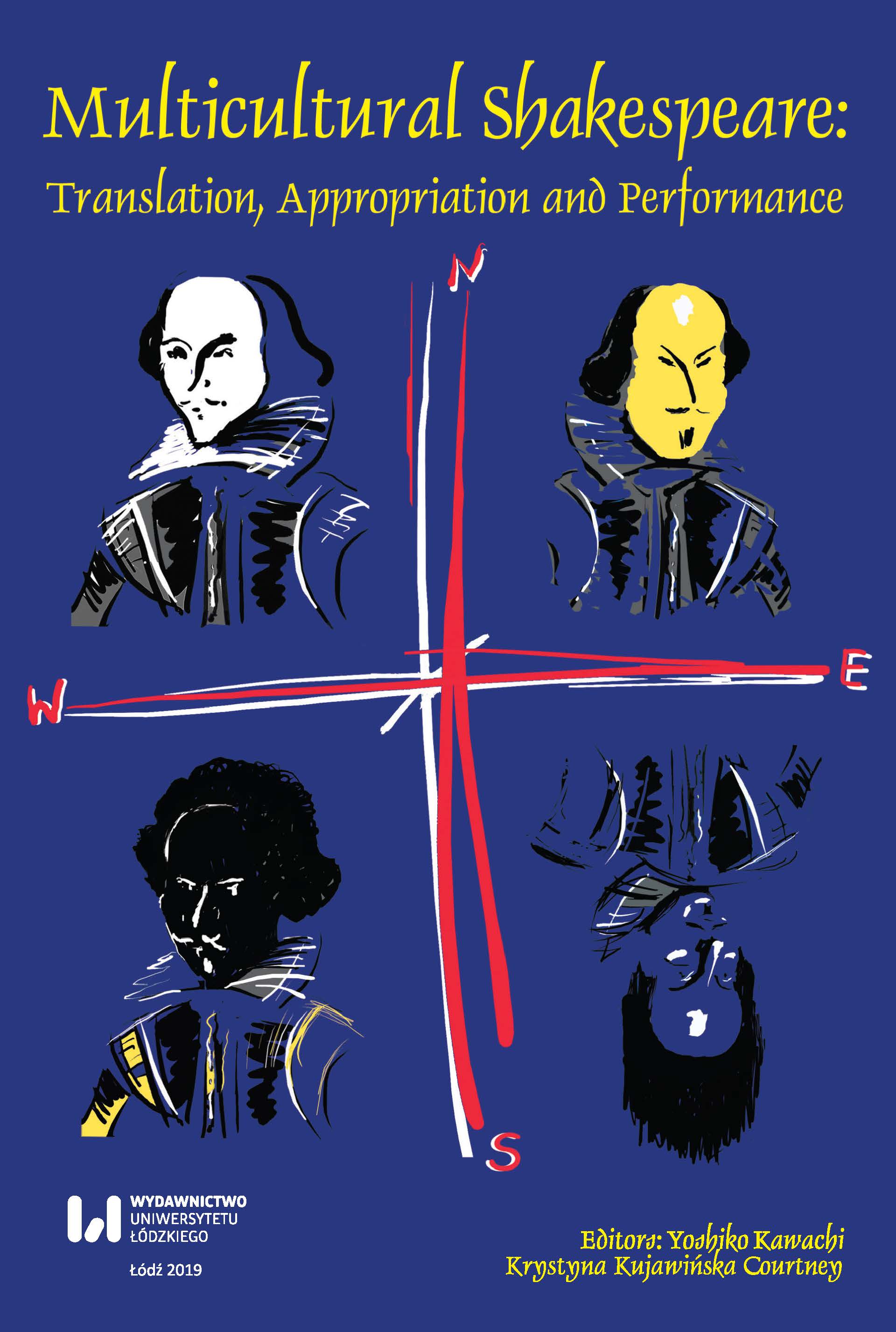East Meets West: Identity and Intercultural Discourse in Chinese huaju Shakespeares
DOI:
https://doi.org/10.18778/2083-8530.20.06Keywords:
huaju, Chinese Shakespeare adaptations, Coriolanus, King Lear, intercultural performance, identity, politicsAbstract
This article examines two huaju performances of Shakespeare—The Tragedy of Coriolanus (2007) and King Lear (2006), which are good examples of cultural exchanges between East and West, integrating Shakespeare into contemporary Chinese culture and politics. The two works provide distinctive approaches to the issues of identity in intercultural discourse. At the core of both productions lies the fundamental question: “Who am I?” At stake are the artists’ personal and cultural identities as processes of globalisation intensify. These performances not only exemplify the intercultural productivity of Shakespearean texts, but more critically, illustrate how Shakespeare and intercultural discourses are internalized and reconfigured by the nation and culture that consume and re-produce them. Chinese adaptations of Coriolanus and King Lear demonstrate how (intercultural) identity is constructed through the subjectivity and iconicity of Shakespeare’s characters and the performativity of Shakespeare’s texts.
Downloads
References
Baxter, Lew. “Shanghai Meets Shakespeare.” Daily Post/Shanghai Star/China Today. 22 November 2006.
Google Scholar
Brook, Peter, The Empty Space. New York: Simon & Schuster Inc., 1968. 布鲁克, 彼得. 敞开的门:谈表演和戏剧. 于东田译. 北京: 新星出版社, 2007. [Brook, Peter. The Open Door: Thoughts on Acting and Theatre. Trans. Yu Dongtian. Beijing: New Star Publishing House, 2007.]
Google Scholar
Brooker, Peter. “Key Words in Brecht’s Theory and Practice of Theatre.” The Cambridge Companion to Brecht. Ed. Peter Thomson and Glendyr Sacks. Cambridge: Cambridge University Press, 2006. 209-24.
Google Scholar
Carlson, Marvin. “The Macaronic Stage.” East of West: Cross-cultural Performances and the Staging of Difference. Ed. Claire Sponsler and Xiaomei Chen. New York: Palgrave, 2000. 15-31.
Google Scholar
Cavendish, Dominic. “Edinburgh Festival 2013: The Tragedy of Coriolanus, review.” The Telegraph. 21 August 2013 http://www.telegraph.co.uk/culture/theatre/edinburgh-festival/10257093/Edinburgh-Festival-013-The-Tragedy-of-Coriolanus-Playhouse-review.html 8 September 2018.
Google Scholar
Chen, Xiaomei, ed. and intro. The Columbia Anthology of Modern Chinese Drama. New York: Columbia University Press, 2010. 1-55.
Google Scholar
Conceison, Claire. “Huang Zuolin Festival (Review).” Theatre Journal 59.3 (2006): 491-93.
Google Scholar
Cooper, Brian G. “Edinburgh International Festival: The Tragedy of Coriolanus.” The Stage Reviews. 22 August 2013. http://www.thestage.co.uk/reviews/review.php/38849/edinburgh-international-festival-the-tragedy 18 September 2018.
Google Scholar
Dickson, Andrew. “Guitar hero: Coriolanus goes rock.” The Guardian. 6 August 2013.
Google Scholar
Ferrari, Rossella. “Transnation/transmedia/transtext: Border-crossing from Screen to Stage in Greater China.” Journal of Chinese Cinemas 2.1 (2008): 52-65.
Google Scholar
Gilbert, Helen and Jacqueline Lo. Performance and Cosmopolitics: Cross-Cultural Transactions in Australia. Hampshire, UK: Palgrave Macmillan, 2007.
Google Scholar
Greenblatt, Stephen, et al. The Norton Shakespeare. 2nd ed. New York and London: W. W. Norton & Company, 2008.
Google Scholar
Grotowski, Jerzy. “The Theatre’s New Testament.” Dramatic Theory and Criticism: Greek to Grotowski. Ed. Bernard F. Dukore. New York: Holt, Rinehart and Winoton Inc., 1974. 978-96.
Google Scholar
Hawkes, Terence. Meaning by Shakespeare. London: Routledge, 1992.
Google Scholar
Hoylewith, Martin. The Tragedy of Coriolanus, Edinburgh Playhouse–review (2013) http://www.ft.com/cms/s/2/d560115c-0a4f-11e3-9cec-00144feabdc0.html#axzz31KEn3SsO 23 May 2019.
Google Scholar
Huang, Alexander (Alexa) C. Y. Chinese Shakespeares: Two Centuries of Cultural Exchange. New York: Columbia University Press, 2009.
Google Scholar
Huang. “King Lear (review) (dir. by David Tse for Yellow Earth Theatre and Shanghai Dramatic Arts Centre) at the Royal Shakespeare Theatre, November 2006.” Theatre Journal 59.3 (2007): 494-95.
Google Scholar
Huang. “Review of King Lear (dir. by David Tse for Yellow Earth Theatre and Shanghai Dramatic Arts Centre) at the Royal Shakespeare Theatre, November 2006.” Shakespeare 3.2 (2007): 239-42.
Google Scholar
Jones, Arthur. China gets on Bard: “Lear” features bilingual script, mixed cast (2006). http://variety.com/2006/legit/news/china-gets-on-bard-1117953713/ 21 August 2018.
Google Scholar
Kennedy, Dennis, ed. Foreign Shakespeare: Contemporary Performance. Cambridge: Cambridge University Press, 1993.
Google Scholar
Li, Ruru. “Millennium Shashibiya: Shakespeare in the Chinese-speaking World.” Shakespeare in Asia: Contemporary Performance. Ed. Dennis Kennedy and Yong Li Lan. Cambridge: Cambridge University Press, 2010. 170-87.
Google Scholar
Li, Ruru. Shashibiya: Staging Shakespeare in China. Hong Kong: Hong Kong University Press, 2003.
Google Scholar
Liang, Lia Wen-Ching. “Negotiating New Terrains: Yellow Earth Theatre’s Lear’s Daughters and King Lear.” Contemporary Theatre Review 19.3 (2009): 289-97.
Google Scholar
林, 克欢. “历史·舞台·表演—评林兆华的文化意向与表演探索.” 艺术评论 [Lin, Kehuan. “History, Stage and Performance: A Critique on Lin Zhaohua’s Cultural Images and Performance Exploration.” Art Review.] 07 (2005): 53-57.
Google Scholar
Ubersfeld, Anne. Reading Theatre. Trans. Frank Collins. Toronto: University of Toronto Press, 1999.
Google Scholar
Willett, John, ed. and trans. Brecht on Theatre. New York: Hill and Wang, 1964.
Google Scholar
Downloads
Published
How to Cite
Issue
Section
License

This work is licensed under a Creative Commons Attribution-NonCommercial-NoDerivatives 4.0 International License.












